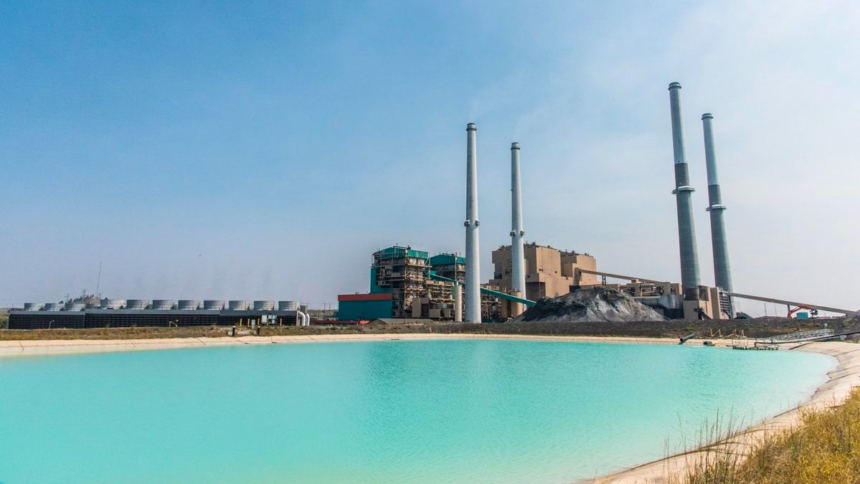NorthWestern Energy announced this week that it will acquire a large share of the Colstrip power plant from Puget Sound Energy, a Washington-based utility facing a mandate to stop using coal-generated power by 2025.
NorthWestern said in a press release that the acquisition will come “at no cost” to the South Dakota-based utility and “allow us to leverage existing infrastructure that is established, dependable, reliable and consistently available when our customers need energy the most.”
The announcement comes two and a half years after Northwestern announced that it had reached a similar deal with Avista, another of the plant’s six current owners. Both transfers — for Puget’s 370-megawatt share and Avista’s 222-megawatt share — are slated to occur on Jan. 1, 2025. The deal also comes as the Colstrip plant faces expensive upgrades required by the new emissions standards the U.S. Environmental Protection Agency announced in April and increasing scrutiny over its reliability following outages during recent periods of peak power demand for NorthWestern, which serves about two-thirds of the state’s energy customers.
Between its existing ownership share and the deals with Avista and Puget, NorthWestern will have a 55% ownership stake in the plant by 2025, the release said, allowing the utility to obtain something it’s long sought — greater control over Colstrip’s management.
“Majority ownership allows NorthWestern Energy to effectively guide investments in operation and maintenance of the Colstrip Plant, ensuring the plant continues to provide on-demand, 24/7 cost-effective generations for our Montana customers until viable, equivalent, carbon-free resources are commercially available,” the company wrote in the release. “Other states require a transition away from coal resources at a pace faster than is feasible in Montana. This no-cost acquisition allows our customers to transition to a cleaner energy future at a pace that works for Montanans.”
“Majority ownership allows NorthWestern Energy to effectively guide investments in operation and maintenance of the Colstrip Plant, ensuring the plant continues to provide on-demand, 24/7 cost-effective generations for our Montana customers until viable, equivalent, carbon-free resources are commercially available.”
NorthWestern Energy press release
Gov. Greg Gianforte touted the deal in the utility’s press release, describing it as “another step in securing a strong future for Montana-made energy.” Clean energy advocates, meanwhile, blasted the deal, arguing that efforts to extend the plant’s operational life will not benefit the state or NorthWestern’s customers, who are already reeling from a significant rate hike utility regulators authorized last year.
Anne Hedges, the co-director of Montana Environmental Information Center, said NorthWestern is pursuing a “terrible deal” for “an ancient coal plant that is prone to breaking down during the times when customers need it most.”
Hedges pointed to the plant’s outages during an intense cold snap that gripped the state in January and during a triple-digit heat wave in July as evidence of the 39-year-old plant’s unreliability. Asked to respond to that criticism, NorthWestern Energy spokesperson Jo Dee Black said in an email that the acquisition would give the company “the ability to ensure [the plant] remains well maintained into the future.”
Hedges said the plant will need upgrades costing $2 billion to comply with tighter pollution standards — $600 million to update its emissions-cleaning technology to comply with public health standards and at least $1.3 billion for the carbon capture and sequestration technology that would allow the plant to continue operating beyond 2032 under the EPA’s greenhouse gas rule.
Black said if an upgrade is necessary to comply with the EPA rule, NorthWestern would pay a prorated portion of the costs based on its ownership percentage. NorthWestern anticipates that the 39-year-old plant will operate until “at least 2042,” Black added.
Hedges said NorthWestern has failed to demonstrate that the additional share of the plant is required for the utility to meet its customers’ needs. Setting responsible energy rates should preclude regulators from saddling NorthWestern’s customers with the costs associated with securing power that it plans to sell to other utilities, she said.
“It has never said it needs this much power, and it doesn’t have the transmission for this power,” Hedges said. “If [the Montana Public Service Commission] allows this utility to acquire this enormous share of Colstrip … then the commission is not doing its job. It is allowing NorthWestern to gamble with our money in electricity markets — and that is a no-no. That is not the way the system is supposed to work.”
Edward Barta, chair of Northern Plains Resource Council, another group critical of NorthWestern’s reliance on fossil fuels, described the acquisition in an emailed statement as “fiscally irresponsible.”
“If [the Montana Public Service Commission] allows this utility to acquire this enormous share of Colstrip … then the commission is not doing its job. It is allowing NorthWestern to gamble with our money in electricity markets — and that is a no-no.”
Anne Hedges, Montana Environmental Information Center
“We deserve affordable energy sources that set our communities up for prosperity in the 21st century,” Barta said. “Instead, NorthWestern wants to recreate the robber-baron era where corporate monopolies grow bigger and richer no matter the costs to the rest of us.”
Through the end of 2024, NorthWestern anticipates spending more than $21 million on operation and maintenance costs under the plant’s current ownership structure, according to Lucas Hamilton, chief legal counsel for the PSC. Coal costs to fuel the plant from July 2024 through June 2025 are currently estimated at $31.5 million, Hamilton added.
This isn’t the first time NorthWestern and Puget have attempted to transfer the ownership of the Colstrip plant. Late in 2019, NorthWestern announced a plan to buy Puget’s share of Colstrip for $1. Within a year, that deal disintegrated due to friction with utility regulators in Washington and a dispute among the plant’s co-owners.
As recently as 2023, Puget had reached a deal with Talen for its Colstrip share, but that deal quietly fell apart. A spokesperson for Talen did not return Montana Free Press’ request for comment.
A Puget spokesperson wrote in an email to MTFP that it will retain its ownership share of the transmission line leading out of Colstrip.
Those transmission lines will be critical to moving Puget’s growing portfolio of Montana wind energy to its customers in western Washington. Earlier this month, Puget announced it had reached an agreement to buy power from a 315-megawatt wind farm under development near Two Dot. Puget is currently building another large wind farm near Rapelje and has a contract for a portion of the wind power coming from the Clearwater Wind Project, the largest wind farm in Montana.
It’s not yet clear whether utility regulators in Montana or Washington will review the transfer’s compliance with those states’ regulatory requirements. In an email to MTFP, a spokesperson for Puget said that the company has been “speaking with our commissioners about this process and will continue to coordinate with the agency and work with NorthWestern to effectuate the exit of PSE as part of our transition of Colstrip in compliance with state law.” Black said NorthWestern does not believe that the acquisition requires commission approval.
Given scant details about the acquisition, it’s difficult to assess the commission’s regulatory role in the matter, Montana Public Service Commission Executive Director Dave Sanders told MTFP.
“I haven’t seen the exact details of the deal, so I don’t want to give a definitive answer at this time, but if it’s a matter of a private purchase agreement and doesn’t have any other implications, normally that would not require commission approval,” Sanders said, adding that NorthWestern’s 2023 deal with Avista did not immediately trigger commission oversight. (When the 2019 deal was announced, NorthWestern said it would seek preapproval from the PSC for the acquisition.)
“The commissioners are just hearing about this now,” Sanders said. “I think when details come out and the staff are able to brief the commissioners, the commission will be able to make a decision about what, if any, actions to take.”
Sanders also said that while the commission has not intervened to block the tighter pollution standards the EPA announced in April, he’s aware that Montana has opposed them. The standards have thus far survived the legal challenges brought by Republican-led states and industry groups.
“We’re obviously going to have a very close look at all of this because these are significant developments in Montana’s energy present and future,” Sanders said.
LATEST STORIES
Montana designs new hurdles for abortion clinics ahead of vote to protect access
Montana is proposing wide-ranging rules for licensing abortion clinics under a disputed state law, raising a new potential obstacle for patients even as a constitutional amendment to protect access appears headed for the November ballot.
How one rural nursing home keeps its doors open — and hopes to grow
Valley View Home has a major catch-22: The Glasgow nursing home can’t take on more patients without also growing its qualified staff. But hiring more people is impossible without increasing revenue. And without a consistently higher threshold of patients — somewhere between 60 and 70, Valley View officials estimate — the facility is far from financially sustainable.
NorthWestern to acquire Energy West in $39M deal
NorthWestern Energy expects to complete the $39 million purchase by the first quarter of 2025, though it’s subject to approval by the Montana Public Service Commission, according to a press release.





